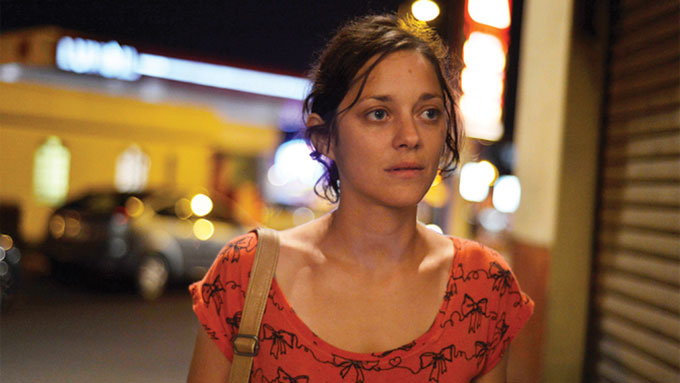Two Days, One Night
by Jordan Canahai

The premise for Jean-Pierre and Luc Dardenne’s latest drama Two Days, One Night couldn’t be simpler, nor its scale smaller or its stakes higher. It concerns one fateful weekend in the life of Sandra (Marion Cotillard), a struggling mother living in Belgium who’s barely getting by, having taken time off from her solar-panel factory job while she recovers from a mental breakdown. In her absence her employers have offered her co-workers generous bonuses to cover her shifts, thus making her obsolete. After a first vote amongst her co-workers that finds them largely in favor of her dismissal, Sandra is left with one weekend to convince at least 9 out of her 16 co-workers, many of whom are just as strapped for cash as she is, to forgo the bonuses and vote instead for her to keep her job.
The struggle between humanist empathy and self-interest is one the Dardennes have explored throughout their body of work, though it has never been addressed as directly as it is here. This is reflected in the movie’s almost episodic structure, much more rigid than in their previous slice-of-life urban dramas such as The Son, L’enfant, and The Kid with a Bike. Thanks to its clock-is-ticking premise Two Days, One Night almost carries the tension of a thriller as it follows Sandra from one encounter to the next, and we come to share the same the desperation that Sandra feels along the way. Despite how her spiel is redundant (the sentence “I wanted to know if you’d be prepared to vote for me to keep my job” is repeated by her word-for-word to every co-worker), each encounter on her odyssey plays out in fascinating and unexpected ways.
The casting of a major actress such as Cotillard by the Dardennes is an unusual choice for them, given their history of working with lesser-known actors, yet any reservations one might have about their decision disappear very quickly. Cotillard is simply transcendent, wholly inhabiting her character and drawing on all her generosity and humanity to bring us into Sandra’s predicament. Hers is a sorrowful performance, given that Sandra understandably relapses into her depression, but punctuated with rare and beautifully judged glimpses of levity and quiet joy. Likewise, the Dardennes prove perfectly adept at capturing her performance through their assured direction, their camera detached yet sympathetic, following her from one moment to the next, brilliantly capturing her life and that of their ethnically diverse supporting cast.
Like in each of the Dardenne’s films, the miracle of Two Days, One Night is that while it takes place entirely during a brief window of time in one small city, it nevertheless seems to cover the whole spectrum of human emotion. In the Dardenne’s cinema there are no clear-cut heroes and villains, only human beings who sometimes choose to help others and sometimes help themselves; while pain and sorrow, light and dark are constantly emerging and even coexisting, much like in life itself. Finally, as the movie reaches its unforgettable final moments and we get a definite answer as to whether Sandra will keep her job or not, we understand, just as she does, that her human spirit has triumphed regardless.
Watch the trailer for Two Days, One Night
|
Issue Navigation> Issue Index > v14n7 (Week of Thursday, February 19) > Film Reviews > Two Days, One Night This Week's Issue • Artvoice Daily • Artvoice TV • Events Calendar • Classifieds |









 Current Issue
Current Issue